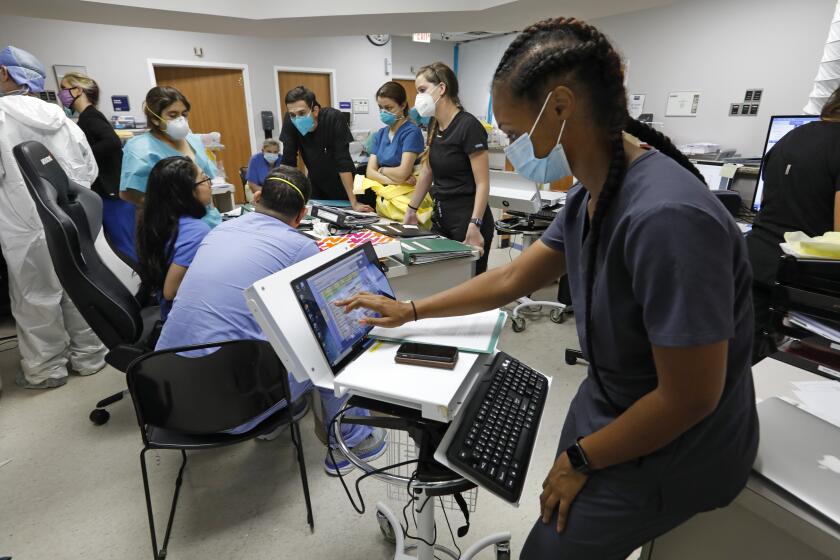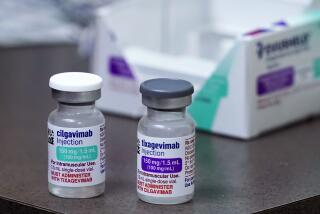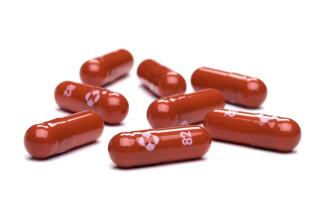Cheap antidepressant shows promise treating early COVID-19

- Share via
A cheap antidepressant reduced the need for hospitalization among high-risk adults with COVID-19, according to results of a study hunting for existing drugs that could be repurposed to treat the pandemic disease.
Researchers tested the pill used for depression and obsessive-compulsive disorder because it was known to reduce inflammation and looked promising in smaller studies.
The medicine, called fluvoxamine, would cost $4 for a course of COVID-19 treatment. By comparison, antibody treatments administered intravenously cost about $2,000, and Merck’s experimental antiviral pill for COVID-19, called molnupiravir, is about $700 per course.
The trial of fluvoxamine was part of a larger research effort known as the Together trial, which has tested several existing medicines for their efficacy against COVID-19. Earlier published results found that the antimalarial drug hydroxychloroquine and the antiparasitic ivermectin — both of which have been touted as “miracle” treatments for COVID-19 — were ineffective.
The researchers shared their results with the U.S. National Institutes of Health, which publishes COVID-19 treatment guidelines, and said they hope the World Health Organization endorses the pill’s use.
“If WHO recommends this, you will see it widely taken up,” said Dr. Edward Mills of McMaster University in Hamilton, Ontario, a co-author of the study published Wednesday in the journal Lancet Global Health.
Mills added that many poor nations have the drug readily available.
“We hope it will lead to a lot of lives saved,” he said.
Forget hydroxychloroquine or Ivermectin. But there is one existing medicine that shows signs of benefiting COVID-19 patients: fluvoxamine.
The trial confirmed earlier research that found promising results from fluvoxamine. These included a study of 152 patients, of whom 80 received the drug and 72 a placebo, conducted by researchers at Washington University in St. Louis.
The latest trial found that fluvoxamine reduced the relative risk of hospitalization or extended emergency care by about 32% and the mortality risk by more than 90%.
Researchers tested the antidepressant in nearly 1,500 Brazilians recently infected with the coronavirus who were at risk of severe cases of COVID-19 because they had other health problems, such as diabetes. The tested treatment involved two pills a day of 100 milligrams each for 10 days, according to Dr. Eric Lenze of Washington University, who conducted the earlier trial and is a co-author of the new paper.
About half the study participants took the antidepressant at home for 10 days, and the rest got a placebo. All of them were tracked for four weeks to see who received hospital treatment or spent extended time in an emergency room when hospitals were full.
In the group that took the drug, 11% needed hospitalization or an extended ER stay, compared with 16% of those on the dummy pills.
Two psychiatrists had a theory, and with support from a Silicon Valley philanthropist they’ve published some encouraging findings.
The results suggested that fluvoxamine is most effective when administered within seven days of the appearance of COVID-19 symptoms.
Independent experts monitoring the study recommended stopping it early because the benefits of the drug were clear.
Questions remain about the best dosing, whether lower-risk patients might also benefit, and whether the pill should be combined with other treatments.
The generic antidepressant and Merck’s COVID-19 pill work in different ways and “may be complementary,” said Dr. Paul Sax of Brigham and Women’s Hospital and Harvard Medical School, who was not involved in the study.
Earlier this month, Merck asked regulators in the U.S. and Europe to authorize its antiviral pill.
Times staff writer Michael Hiltzik contributed to this report.








